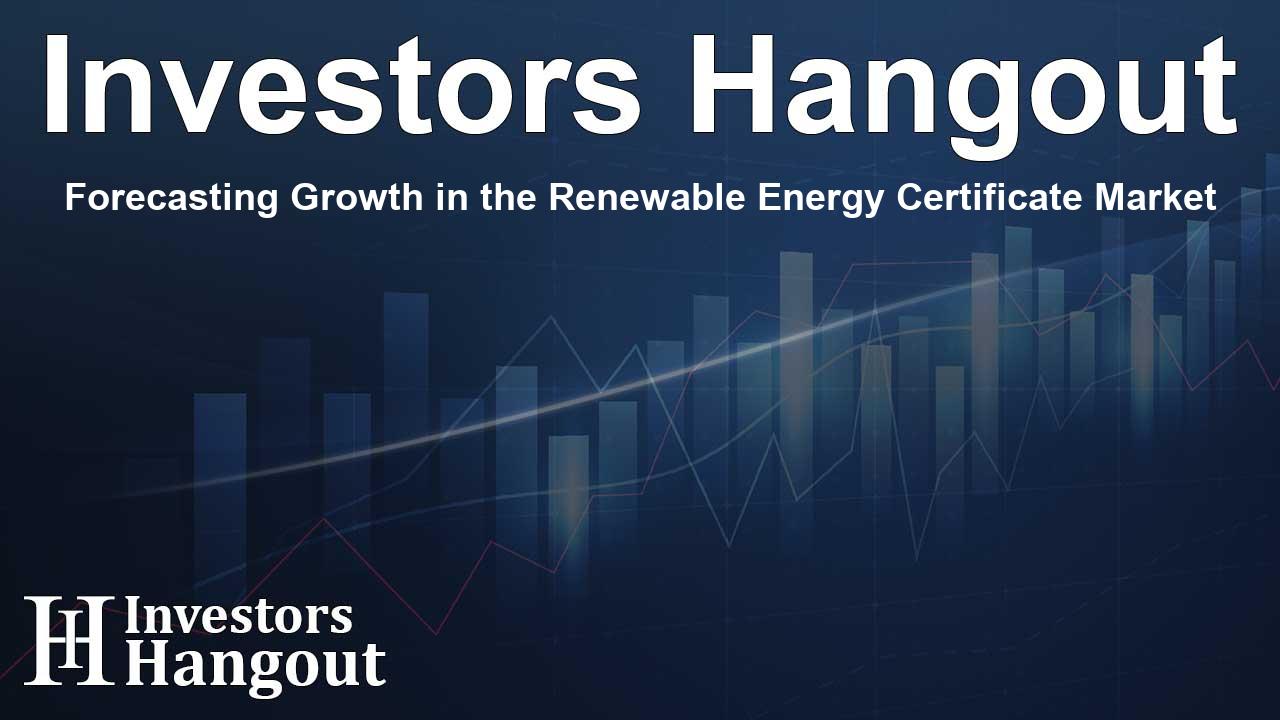Forecasting Growth in the Renewable Energy Certificate Market

The Future of Renewable Energy Certificates
As the world pivots toward greener energy solutions, the market for Renewable Energy Certificates (RECs) is on a significant upward trajectory. Forecasts indicate this market could grow from approximately USD 27.99 billion to USD 45.45 billion by the end of the decade, reflecting a healthy compound annual growth rate (CAGR) of 10.2%. This growth brings exciting opportunities for stakeholders committed to promoting sustainability in their operations.
Driving Forces Behind Market Growth
Several driving forces contribute to the anticipated growth of the REC market. At the forefront is the increasing demand from corporations striving for sustainability in accordance with consumer preferences. More businesses are recognizing that sustainability is not just a trend, but a necessary component of long-term strategy. This is further reinforced by an uptick in national regulations requiring transparency in energy consumption disclosures.
Moreover, organizational interest in entering Power Purchase Agreements (PPAs) has provided a solid foundation for the REC marketplace. These legal contracts allow businesses to secure renewable energy at fixed prices, making it an attractive option as firms endeavor to align their energy consumption with their sustainability goals. Over time, RECs have become the cornerstone for organizations wishing to credibly assert their involvement in renewable energy usage.
Insights into REC Capacity Segments
Within the REC market, capacity segments are experiencing noticeable developments. Presently, the segment of over 5,000 kWh leads, predominantly driven by large-scale industrial entities. However, significant growth is also seen in the 1,001 to 5,000 kWh capacity segment, as many businesses seek to balance energy usage with their sustainability initiatives. Interestingly, smaller capacity segments, particularly those less than 1,000 kWh, are undergoing rapid growth as residential and small commercial consumers become increasingly aware and proactive about renewable energy.
The Role of Solar Power
Solar energy plays a pivotal role in promoting the significance of RECs. These certificates serve as a powerful financial motivator for solar power developers, encouraging the production of energy from solar sources. As the global transition to cleaner energy sources accelerates, RECs are becoming integral in quantifying and facilitating the adoption of renewables, making them essential instruments for paving the way toward a sustainable future.
Geographical Insights: The Asia-Pacific Region
In recent years, countries within the Asia-Pacific region have made notable strides in increasing renewable energy production. Nations are focusing extensively on solar and wind energy, establishing supportive frameworks that include feed-in tariffs and REC programs. Among the leading countries enhancing their REC markets are China, Japan, and Australia. As part of the International Renewable Energy Certificate (I-REC) initiative, the growth in these nations illustrates the region's commitment to global sustainability efforts.
Key Players Shaping the Market
As the REC market flourishes, several key players are at the forefront of innovation and implementation. Companies like 3Degrees, Inc., Statkraft, and Enel Spa are transforming how renewable energy is generated and marketed. For instance, 3Degrees is recognized for helping clients transition to a low-carbon economy through its comprehensive portfolio of Renewable Energy Certificates sourced from diverse renewable projects. Statkraft, a Norwegian leader in renewable energy, emphasizes innovations in hydropower, wind power, and solar energy. Enel Spa, with its broad operations across multiple continents, offers substantial resources in both compliance and voluntary REC markets.
Conclusion: Looking Ahead
The Renewable Energy Certificate market is not just an emerging field; it's a vital component of the global shift toward sustainable energy practices. With the right strategies and support from regulatory frameworks, the potential for RECs to drive significant positive changes in the energy landscape is enormous. As more organizations commit to sustainability, the REC market will likely see continued growth, bolstering the demand for renewable energy solutions worldwide.
Frequently Asked Questions
What is a Renewable Energy Certificate (REC)?
A Renewable Energy Certificate, or REC, represents proof that one megawatt-hour of renewable energy has been generated. It allows consumers to support renewable energy initiatives.
How is the REC market expected to change over the next decade?
The REC market is projected to grow significantly, reaching USD 45.45 billion by 2030, driven by increased corporate interest in sustainability and regulatory pressures.
What role do solar power and wind energy play in the REC market?
Solar and wind energy are major contributors to the REC market, as these renewable sources generate the certificates necessary for organizations to assert their commitment to clean energy.
Why are smaller capacity segments gaining attention in the REC market?
Smaller capacity segments, particularly those under 1,000 kWh, are expanding as residential and small businesses increasingly adopt renewable energy solutions and seek to lower their energy costs.
Who are the main players in the Renewable Energy Certificate market?
Key players include 3Degrees, Inc., Statkraft, and Enel Spa, which are actively working on providing innovative solutions and services related to renewable energy and RECs.
About The Author
Contact Addison Perry privately here. Or send an email with ATTN: Addison Perry as the subject to contact@investorshangout.com.
About Investors Hangout
Investors Hangout is a leading online stock forum for financial discussion and learning, offering a wide range of free tools and resources. It draws in traders of all levels, who exchange market knowledge, investigate trading tactics, and keep an eye on industry developments in real time. Featuring financial articles, stock message boards, quotes, charts, company profiles, and live news updates. Through cooperative learning and a wealth of informational resources, it helps users from novices creating their first portfolios to experts honing their techniques. Join Investors Hangout today: https://investorshangout.com/
The content of this article is based on factual, publicly available information and does not represent legal, financial, or investment advice. Investors Hangout does not offer financial advice, and the author is not a licensed financial advisor. Consult a qualified advisor before making any financial or investment decisions based on this article. This article should not be considered advice to purchase, sell, or hold any securities or other investments. If any of the material provided here is inaccurate, please contact us for corrections.
